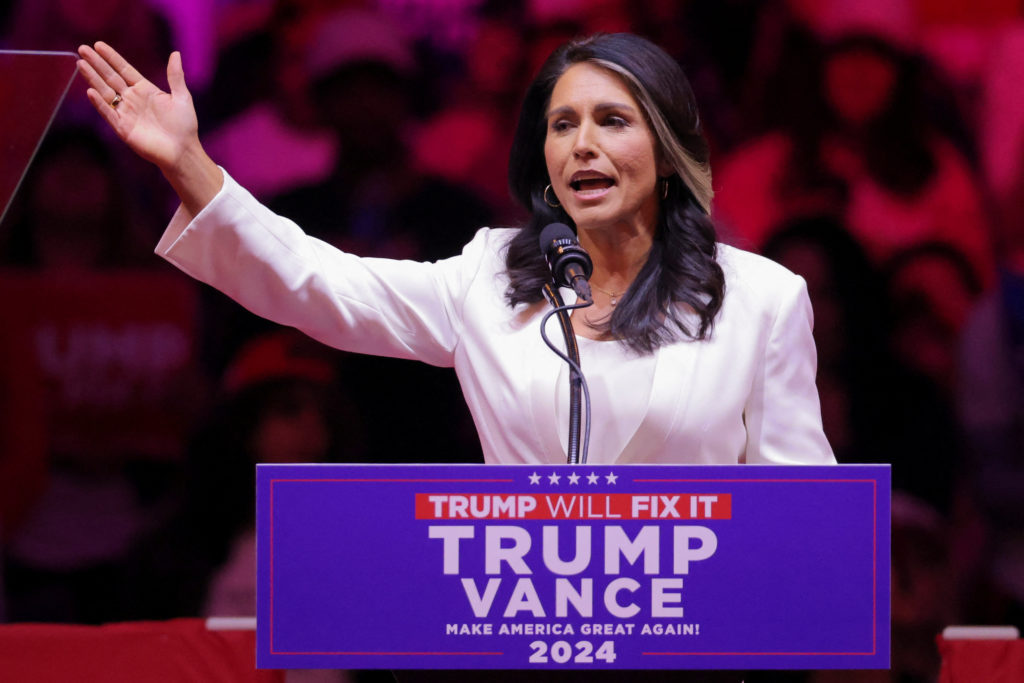WASHINGTON (AP) — President-elect Donald Trump has nominated former Democratic Congresswoman Tulsi Gabbard to be the next director of national intelligence. The director is a powerful position at the top of the country’s spy agency and serves as the president’s chief intelligence advisor.
Read more: President Trump selects Tulsi Gabbard as Director of National Intelligence
Gabbard is a military veteran with more than 20 years of service, but she lacks the intelligence experience typical of past officials. She left the Democratic Party in 2022 and endorsed Trump earlier this year, gaining popularity among his supporters.
Here are some things you should know about Gabbard.
She was the first Hindu elected to parliament
Gabbard, 43, was born in American Samoa, raised in Hawaii and spent a year of her childhood in the Philippines. She was first elected to the Hawaii House of Representatives at the age of 21, but had to resign after one term because National Guard troops were deployed to Iraq.
She was later elected to Congress representing Hawaii. As the first Hindu member of Congress, Gabbard took the oath of office with her hand on the Bhagavad Gita, a Hindu religious work. She was also the first American Samoan to be elected to Congress.
Read more: Congresswoman Gabbard makes unannounced visit to Syria
During her four terms in the House of Representatives, she became known for speaking out against the party’s leadership. Her early endorsement of Sen. Bernie Sanders in the 2016 Democratic presidential primary made her a popular figure in progressive politics nationally.
Gabbard is married to cinematographer Abraham Williams. Her father, Mike Gabbard, is a state senator who was first elected as a Republican but switched parties and became a Democrat.
She ran for president but then left the party
Gabbard sought the 2020 Democratic presidential nomination on a progressive platform and opposition to U.S. involvement in foreign military conflicts.
She cited her military experience to argue that America’s wars in the Middle East have destabilized the region, made America less secure, and claimed thousands of American lives. She blamed her party for not opposing the war. In one preliminary debate, she criticized then-Sen. Kamala Harris’ record as a prosecutor.
Gabbard later withdrew from the race and endorsed the eventual winner, President Joe Biden.
Read more: Tulsi Gabbard ends 2020 presidential campaign
Two years later, she left the Democratic Party, claiming the old party was controlled by an “elite cabal of warmongers” and “woke” ideologues. She has since campaigned for several prominent Republicans, become a Fox News contributor, and started a podcast.
“The Democratic Party today is indistinguishable from the party I joined 20 years ago,” she said when explaining her decision.
she’s a star in the trump world
Ms. Gabbard endorsed Mr. Trump earlier this year, and her endorsement quickly made her popular among Mr. Trump’s supporters.
Ms. Gabbard often appears alongside Robert F. Kennedy Jr., who challenged Mr. Biden as the Democratic nominee before transitioning to an independent candidacy and then ultimately endorsing Mr. Trump. He spoke for his appeal, which transcends political boundaries.
Gabbard helped Trump prepare for a debate with Harris this year. In October, during an altercation with President Trump at a rally in North Carolina, she announced that she was officially becoming a Republican, calling the current Democratic Party “totally unrecognizable” compared to her former Democratic Party. .
Read more: President Trump showed he values loyalty and retribution by nominating close ally Gates
Mr. Trump has given both Ms. Gabbard and Mr. Kennedy roles during the presidential transition, helping make administration appointments and influencing the policies that the federal bureaucracy pursues if she returns to the White House. There is a possibility of giving.
She’s a military veteran, but not an intelligence insider
Gabbard served in the Army National Guard for more than 20 years and was deployed to Iraq and Kuwait.
She received the Combat Medical Badge in 2005 for “participating in combat operations under enemy fire in support of Operation Iraqi Freedom III,” according to the Hawaii National Guard.
Unlike her predecessors, she does not hold a senior government position. She served on the House Homeland Security Committee for two years.
Read more: President Trump returns to Washington promising to overturn federal government
The current director, Avril Haines, was confirmed by the Senate in 2021 after several years in the top national security and intelligence jobs. Ms. Haynes is the first woman to hold the position.
She will oversee President Trump’s potential intelligence reform
President Trump has said he wants to overhaul the nation’s intelligence agencies, a branch of the federal government that has long been viewed with suspicion and mistrust. The president-elect accused U.S. intelligence agencies of trying to undermine his first administration and his campaign.
He also characterized the intelligence community as part of the “deep state” (his term for the thousands of public servants working in numerous government agencies), but Trump does not consider them sufficiently loyal. Not considered.
Read more: President Trump nominates John Ratcliffe as CIA director. Here’s what you need to know
“I’m going to get rid of all the corrupt officials in the national security and intelligence community, and there are a lot of them,” President Trump said in 2023, when explaining his priorities for his second term. “Weaponized ministries will be overhauled.”
The Office of the Director was created in 2004 as part of a series of changes to the U.S. intelligence community after the September 11, 2001 attacks. Lawmakers had hoped the new office would streamline interagency cooperation and prevent intelligence failures.
The bureau played a key role in the government’s efforts to identify and expose efforts by Russia, China and Iran to spread false and misleading claims about voting and democracy ahead of last week’s U.S. presidential election. . Other divisions focus on cyber threats, counter-terrorism and counter-espionage.



